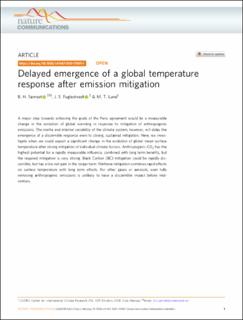Delayed emergence of a global temperature response after emission mitigation
Journal article, Peer reviewed
Published version

Åpne
Permanent lenke
https://hdl.handle.net/11250/2771093Utgivelsesdato
2020Metadata
Vis full innførselSamlinger
- Journal articles [478]
Sammendrag
A major step towards achieving the goals of the Paris agreement would be a measurable change in the evolution of global warming in response to mitigation of anthropogenic emissions. The inertia and internal variability of the climate system, however, will delay the emergence of a discernible response even to strong, sustained mitigation. Here, we investigate when we could expect a significant change in the evolution of global mean surface temperature after strong mitigation of individual climate forcers. Anthropogenic CO2 has the highest potential for a rapidly measurable influence, combined with long term benefits, but the required mitigation is very strong. Black Carbon (BC) mitigation could be rapidly discernible, but has a low net gain in the longer term. Methane mitigation combines rapid effects on surface temperature with long term effects. For other gases or aerosols, even fully removing anthropogenic emissions is unlikely to have a discernible impact before mid-century.
